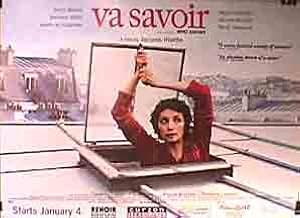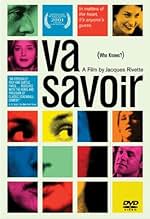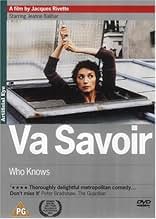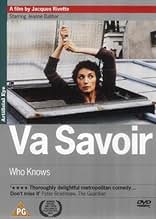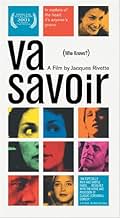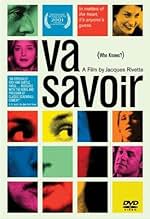AVALIAÇÃO DA IMDb
6,8/10
2,6 mil
SUA AVALIAÇÃO
Adicionar um enredo no seu idiomaQuick-witted, well-read cultured types revolve around each other in a delightful potpourri of theatre, romanticism and theft.Quick-witted, well-read cultured types revolve around each other in a delightful potpourri of theatre, romanticism and theft.Quick-witted, well-read cultured types revolve around each other in a delightful potpourri of theatre, romanticism and theft.
- Direção
- Roteiristas
- Artistas
- Prêmios
- 3 vitórias e 3 indicações no total
Valeria Cavalli
- Ines
- (as Valéria Cavalli)
Avaliações em destaque
I was bored to death by this movie. The main character is a self-centered and selfish actress whose problems failed to interest me. I stayed with it for an hour, and walked away; my wife said it became somewhat better toward the end. If all drama must be divided into comedy and tragedy, then in that sense this is a comedy. However, when movie reviewers call a movie a comedy, I think we are entitled to believe they mean it is funny. Tastes differ, and I accept that some might find this movie interesting, but by no stretch of the imagination could anyone in his right mind call it "funny." I wouldn't have rented this video except for a quotation on the box, in which A. O. Scott of The New York Times wrote, "An especially rich and subtle farce . . . resolved with the verve and precision of classic screwball comedy."
Having read many of the comments of "Va Savoir" here, (admittedly mostly from the other side of the Atlantic), I was surprised by the amount of hostility towards this film.
Whilst I admit that it may have benefited from a little judicious editing, perhaps down to around two hours, this seems to me to be a well acted and entertaining slice of french life. The fact that the main characters are involved in the theatre is entirely secondary since their "real" lives depicted here are infinitely more interesting than the characters being portrayed in the Pirandello play. Perhaps that was the point.
There are enough sub-plots and unanswered questions relating to the fully rounded, three dimensional characters to keep the average viewer engrossed for the length of the film. They do not conform to stereotypes and it is not possible to pigeon-hole them. We find out much more about them as the film progresses. This is a film about people, their interwoven histories, and the formation of new relationships.
Jeanne Balibar's performance, seemed to me, complex and mature. Initially, I found her portrayal cold and unemotional, but this I believe was intentional and as the film progresses, she is revealed as a complicated and enigmatic character, capable of intense emotions but also of granting sexual favours just to create a diversion.
There is also a fine performance from Sergio Castellitto as Ugo, entirely convincing, except perhaps in his refusal to bed the truly delicious "Do" played by a ravishing Hélène de Fougerolles, (surely another French actress destined for greatness). Indeed, Jacques Rivette seems to have nurtured excellent performances all round.
Whilst this is not a perfect film, it offers more than enough to warrant a few short hours of your time. This is a fine French film, which will remain in your memory for sometime to come and compared with much of Hollywood's current output, is a mature and thought-provoking piece of film making. Open a good bottle of red Bordeaux and settle down with its cinematic equivalent.
Whilst I admit that it may have benefited from a little judicious editing, perhaps down to around two hours, this seems to me to be a well acted and entertaining slice of french life. The fact that the main characters are involved in the theatre is entirely secondary since their "real" lives depicted here are infinitely more interesting than the characters being portrayed in the Pirandello play. Perhaps that was the point.
There are enough sub-plots and unanswered questions relating to the fully rounded, three dimensional characters to keep the average viewer engrossed for the length of the film. They do not conform to stereotypes and it is not possible to pigeon-hole them. We find out much more about them as the film progresses. This is a film about people, their interwoven histories, and the formation of new relationships.
Jeanne Balibar's performance, seemed to me, complex and mature. Initially, I found her portrayal cold and unemotional, but this I believe was intentional and as the film progresses, she is revealed as a complicated and enigmatic character, capable of intense emotions but also of granting sexual favours just to create a diversion.
There is also a fine performance from Sergio Castellitto as Ugo, entirely convincing, except perhaps in his refusal to bed the truly delicious "Do" played by a ravishing Hélène de Fougerolles, (surely another French actress destined for greatness). Indeed, Jacques Rivette seems to have nurtured excellent performances all round.
Whilst this is not a perfect film, it offers more than enough to warrant a few short hours of your time. This is a fine French film, which will remain in your memory for sometime to come and compared with much of Hollywood's current output, is a mature and thought-provoking piece of film making. Open a good bottle of red Bordeaux and settle down with its cinematic equivalent.
6seeb
This is an interesting, yet at times boring movie. It is not boring necessarily because you get bored while watching, but it's because you don't get attached to any of the characters for a long time. There are two stories going on. They are intertwined. The story of the play that we don't understand much about, except seeing the possible alterego of our main woman character and also of course there is the story of these six individuals, three men and three women. They are all in search of something literally or symbolically.
While watching this film, you might pause, have some dinner, go back, continue. The phone rings, you forget about it, start watching again, and fall asleep. The next morning, you wake up, decide to watch, you think of looking it up at IMDb and you just do that. Throughout the film, there is a huge amount of feeling going back and forth, but we all (together with the director, the movie cast and the crew) watch it all happen as if it's not even happening. In a way, the movie is too French-cool, which also makes it unique. This attachment I am talking about, because of its non-existence, you might just end up finishing the film in three days, but maybe the more crucial thing is that no matter what, you do wanna go back and see what's haunting you. You can't let go. In a way, that's exactly what the main character feels. She can't let go either. There is something calm about her, something serene. We are not impressed at first, but slowly she becomes a goddess of determination and genuineness. Yet, there is something that triggers her mind and it steals her peace.
Luckily as time goes on, we observe her internal-peace-movement. In this sense, this movie is either very successful and it gave me the exact feeling, or maybe I am overly empathetic : )
It did take me 3 days to watch, with numerous interruptions of daily life, and I even stopped watching now and started writing this review.
Yes, I do not know the ending yet. Do watch it, if you are someone who does a lot of thinking about the complexities of interpersonal relationships (especially about romantic ones), but make sure you are patient, interested, and ready to think.
While watching this film, you might pause, have some dinner, go back, continue. The phone rings, you forget about it, start watching again, and fall asleep. The next morning, you wake up, decide to watch, you think of looking it up at IMDb and you just do that. Throughout the film, there is a huge amount of feeling going back and forth, but we all (together with the director, the movie cast and the crew) watch it all happen as if it's not even happening. In a way, the movie is too French-cool, which also makes it unique. This attachment I am talking about, because of its non-existence, you might just end up finishing the film in three days, but maybe the more crucial thing is that no matter what, you do wanna go back and see what's haunting you. You can't let go. In a way, that's exactly what the main character feels. She can't let go either. There is something calm about her, something serene. We are not impressed at first, but slowly she becomes a goddess of determination and genuineness. Yet, there is something that triggers her mind and it steals her peace.
Luckily as time goes on, we observe her internal-peace-movement. In this sense, this movie is either very successful and it gave me the exact feeling, or maybe I am overly empathetic : )
It did take me 3 days to watch, with numerous interruptions of daily life, and I even stopped watching now and started writing this review.
Yes, I do not know the ending yet. Do watch it, if you are someone who does a lot of thinking about the complexities of interpersonal relationships (especially about romantic ones), but make sure you are patient, interested, and ready to think.
The play within a play ploy is used in Go Figure to excellent effect. The play is an eighteenth century farce performed by an Italian acting troupe visiting Paris. The farce utilizes six characters, the optimal number to engage in romantic mix-ups, flirtations, and other amorous stuff. And lo and behold, Go Figure itself contains six persons who engage in romantic mix-ups, flirtations, and crimes, both physical and of the heart.
There's the lead actress and her stage manager husband; she, who walked out on her now married ex-lover, whom she meets for the first time in three years (as well as his wife). Rounding out the six are two siblings, one a sexy young lady, the other her caddish older brother. There's jewel theft, a hunt for a missing manuscript, jealousy, and the falling in and out of love. And in the backdrop the acting troupe struggles to remains solvent.
All this is served up in, what I would call a French style. Of course I've not seen that many French romantic comedies, but I can state that were this in the hands of an American 'Hollywood' director it would be an entirely different film. And probably not nearly as good. In Rivette's hands all the action and interactions seem natural and light. There's no 'look at me' style of acting; it's almost understated. And this makes for a very enjoyable viewing that loses little on the small screen.
There's the lead actress and her stage manager husband; she, who walked out on her now married ex-lover, whom she meets for the first time in three years (as well as his wife). Rounding out the six are two siblings, one a sexy young lady, the other her caddish older brother. There's jewel theft, a hunt for a missing manuscript, jealousy, and the falling in and out of love. And in the backdrop the acting troupe struggles to remains solvent.
All this is served up in, what I would call a French style. Of course I've not seen that many French romantic comedies, but I can state that were this in the hands of an American 'Hollywood' director it would be an entirely different film. And probably not nearly as good. In Rivette's hands all the action and interactions seem natural and light. There's no 'look at me' style of acting; it's almost understated. And this makes for a very enjoyable viewing that loses little on the small screen.
A light Rivette; Va Savoir (2001) is a film that features many of the director's most recognisable traits and characteristics familiar from the unwieldy and progressive films that he made in the late 1960's and early 1970's, but done in such a way as to suggest a more frivolous or throwaway tone with the emphasis placed more squarely on the elements of comedy and farce. This doesn't necessarily mean that the film is bad, or that it fails in some way to compare to the more iconic likes of Paris nous appartient (1960), L'amour fou (1969), Out 1 (1971) and Celine and Julie Go Boating (1974) - all of which are referenced here - but rather, that it shows a process of simplification; with Rivette taking his chosen themes - such as performance, miscommunication and the battle of the sexes - and allowing the characters to take precedence over the story, as opposed to the experiments with the film-making form. Perhaps this is emblematic of Rivette's more recent work over the last twenty years, though having only seen La Belle Noiseuse (1991) from his post Celine and Julie projects (admittedly missing out on a great deal of the man's career), I can only make the obvious comparisons.
Nonetheless, the relative simplicity and emphasis on character worked well here; with Rivette keenly following the trials and tribulations of a small collection of characters all bumbling about the woes of modern relationship difficulties from an upper-middle class perspective. Along the way we have the usual self-reflexive comments on the nature of performance and of film-making itself, with the story revolving around an Italian-language production of Luigi Pirandello's "As You Desire Me" that the central couple are appearing in. In some respects the film reminded me of the work of Woody Allen, with the ensemble nature of the narrative and the film's social milieu suggesting elements of Hannah and her Sisters (1986), Husbands and Wives (1994) and the more recent Melinda and Melinda (2004), while the idea of a play (or film) that is both a part of the story and also a subtle comment on it reminded me of Stardust Memories (1980), The Purple Rose of Cairo (1984) and Bullets Over Broadway (1994). As with those particular films, Va Savoir offers a narrative in which the subtle juxtaposition of the characters thoughts, feelings and social interactions creates a comedy of errors to undercut many of the more dramatic or self-consciously self-reflexive elements of the film.
As ever with Rivette - or at least the work of his that I've so far seen - the film moves perfectly between the various characters and their roles and interactions, as the skillful sense of choreography between the different layers of the narrative and the impeccable comic-performances of the cast help to draw us in to the story and lead us towards that quietly brilliant final act. I can certainly understand why many would dislike the film; it's long, deals exclusively in character interaction (on at least two separate levels) and creates a world that is stuffy and intellectual, no doubt seemingly horribly pretentious to those unwilling to spend more than thirty minutes with these characters or the world that Rivette creates. Regardless, I personally think that Va Savoir is a fine film; both intelligent and entertaining and with that spark and spirit so recognisable in the director's work from Paris nous appartient to the celebrated Celine and Julie.
Nonetheless, the relative simplicity and emphasis on character worked well here; with Rivette keenly following the trials and tribulations of a small collection of characters all bumbling about the woes of modern relationship difficulties from an upper-middle class perspective. Along the way we have the usual self-reflexive comments on the nature of performance and of film-making itself, with the story revolving around an Italian-language production of Luigi Pirandello's "As You Desire Me" that the central couple are appearing in. In some respects the film reminded me of the work of Woody Allen, with the ensemble nature of the narrative and the film's social milieu suggesting elements of Hannah and her Sisters (1986), Husbands and Wives (1994) and the more recent Melinda and Melinda (2004), while the idea of a play (or film) that is both a part of the story and also a subtle comment on it reminded me of Stardust Memories (1980), The Purple Rose of Cairo (1984) and Bullets Over Broadway (1994). As with those particular films, Va Savoir offers a narrative in which the subtle juxtaposition of the characters thoughts, feelings and social interactions creates a comedy of errors to undercut many of the more dramatic or self-consciously self-reflexive elements of the film.
As ever with Rivette - or at least the work of his that I've so far seen - the film moves perfectly between the various characters and their roles and interactions, as the skillful sense of choreography between the different layers of the narrative and the impeccable comic-performances of the cast help to draw us in to the story and lead us towards that quietly brilliant final act. I can certainly understand why many would dislike the film; it's long, deals exclusively in character interaction (on at least two separate levels) and creates a world that is stuffy and intellectual, no doubt seemingly horribly pretentious to those unwilling to spend more than thirty minutes with these characters or the world that Rivette creates. Regardless, I personally think that Va Savoir is a fine film; both intelligent and entertaining and with that spark and spirit so recognisable in the director's work from Paris nous appartient to the celebrated Celine and Julie.
Você sabia?
- CuriosidadesSergio Castellitto dubbed himself in the french version, while Jeanne Balibar dubbed herself in the italian's.
- Erros de gravaçãoA child and a bicycle in the background disappears between shots in the park.
- Citações
Cammille B.: I really should calm down. I knew this would happen. It was coming. I should have said no, not a chance, not Paris. Even three years later, I can't.
- Versões alternativasRivette's original 220 minute cut called Va Savoir+ premiered on 24 April 2002 and ran for seven weeks at only one theater, the Cinéma du Pantheon in Paris, selling a total of 1,734 tickets. Rivette said that Va Savoir+ was a completely different film than Va Savoir, the major difference being lengthy scenes of the actors performing Pirandello's "Come tu mi vuoi" instead of just rehearsals. The director stated that in the longer version, Pirandello's play is "another character" in the film.
- ConexõesFeatured in Tempus fugit, manet amor: Jacques Rivette à propos de Va savoir (2008)
Principais escolhas
Faça login para avaliar e ver a lista de recomendações personalizadas
- How long is Who Knows??Fornecido pela Alexa
Detalhes
- Data de lançamento
- Países de origem
- Central de atendimento oficial
- Idiomas
- Também conhecido como
- Who Knows?
- Locações de filme
- Empresas de produção
- Consulte mais créditos da empresa na IMDbPro
Bilheteria
- Faturamento bruto nos EUA e Canadá
- US$ 907.323
- Fim de semana de estreia nos EUA e Canadá
- US$ 43.010
- 30 de set. de 2001
- Faturamento bruto mundial
- US$ 2.039.644
- Tempo de duração2 horas 34 minutos
- Cor
- Mixagem de som
- Proporção
- 1.85 : 1
Contribua para esta página
Sugerir uma alteração ou adicionar conteúdo ausente

Principal brecha
By what name was Quem Sabe? (2001) officially released in Canada in English?
Responda






